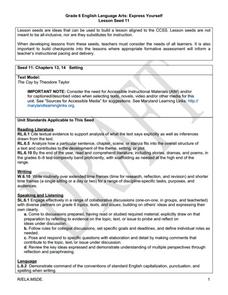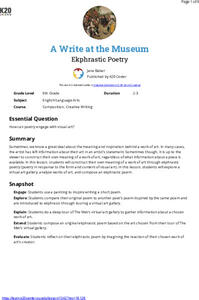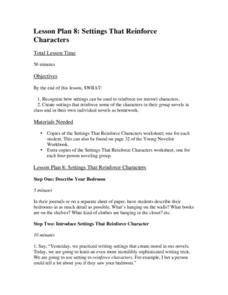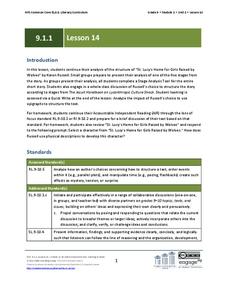Berkshire Museum
Nature Journaling: Experience the Outdoors Through Writing and Drawing
Step into the great outdoors and develop young scientists' skills of observation with a nature journaling lesson. Given a specific focus or goal, children practice making and recording observations of nature through written descriptions...
Curated OER
Express Yourself Lesson Seed 11: Setting
Encourage your learners to examine the setting in Theodore Taylor's The Cay. Pupils work in small groups to put together a description of the setting before reading two more chapters of the book. They use their double-entry journals to...
Film English
The Conditioned
Discover the lovely story of Raimundo Arruda Sobrinho with your class. Over the course of the lesson, pupils practice descriptive writing, write short narratives, collaborate in small groups, watch a powerful short film about Raimundo,...
K20 LEARN
A Write At The Museum: Ekphrastic Poetry
Which came first—the painting or the poem? For this case, it is the painting. Scholars closely examine a work of art and then craft an ekphrastic poem in response. A carefully scaffolded nine-page plan leads young poets through the process.
Houghton Mifflin Harcourt
Special Friends: English Language Development Lessons (Theme 9)
Enhance language proficiency with a Special Friends themed English language development unit. Each lesson follows a listen, speak, move, and/or look routine that is guaranteed to get your scholars discussing topics such as animal...
Film English
Moments
Examine homelessness through a series of writing and discussion activities and a short film. Learners first come up with their own stories based on images of characters in the film. They then watch the film and respond to a series of...
Berkshire Museum
Adopt a Schoolyard Tree
Help young scientists connect with nature and learn about trees with a fun life science lesson plan. Heading out into the school yard, children choose a tree to adopt, taking measurements, writing descriptions, and drawing sketches of it...
Curated OER
The Sound of…Poetry!
Scritch, scratch, scritch. It's the sound of pupils writing poetry! Focus on sensory language and onomatopoeia with a writing instructional activity. After listening to some sounds, learners examine a couple of poems that include sound...
Channel Islands Film
Lone Woman of San Nicolas Island: Lesson Plan 2
After watching West of the West's documentary The Lone Woman of San Nicolas Island, class members imagine how Juana Maria/Karana may have felt about living alone on the island for 18 years and craft a blackout poem or a narrative in her...
Curated OER
Lesson 8: Settings that Reinforce Characters
The best way to be a good writer is to read good writing. Learners read and discuss an excerpt from a book that will help them comprehend the relationship between setting and character. They will use what they've gleaned from discussion...
Berkshire Museum
Meet a Naturalist: Researching, Writing, Interviewing
Young scholars reach out into the community and learn about different environmental science careers in this inquiry-based instructional activity. Beginning with a short research assignment, children gain background knowledge about...
EngageNY
Storyboard Revision: Managing the Sequence of Events and Using Sensory Details
Mastering techniques from the resource, pupils give life to their writing, revising their storyboards to include sensory details and transitions. To finish, they participate in a peer critique process and use the feedback to further...
Curated OER
How Do Adjectives Improve Writing?
Using adjectives to create vivid descriptions is the focus of exercises in this resource. A cloze reading activity asks class members to add missing adjectives to passages from Mark Teague's The Lost and Found. They then read Teague's...
EngageNY
Grade 9 ELA Module 1, Unit 1, Lesson 14
Karen Russell's short story "St. Lucy's Home for Girls Raised by Wolves" has a unique structure that adds value to the story. With the fourteenth activity in a unit about literary analysis and textual support, analyze how Russell has...
Scholastic
Writing to a Historical Poet
Poetry is a very personal and introspective art form. Give your class the opportunity to understand how a poet's voice can speak to them on a personal level, and that every reader can respond to an author differently. After a poetic...
Film English
If At First You Don't Succeed
When faced with a challenge, how do your pupils respond? Starting with character analyses, learners participate in a activity about appearances and perseverance. They watch a short film, talk about common English expressions, and write a...
Curated OER
Lesson: Unmonumental: Final Projects
If you've used any of the New Class Museum lessons exploring the theme, Unmonumental, then check this out! Included are three different final project ideas that tie into the other seven Unmonumental lessons. Kids create community through...
Star Wars in the Classroom
"Shakespeare and Star Wars": Lesson Plan Day 6
How can a screenplay create meaning and drama in ways that other forms of writing cannot? That is the question class members must answer as they compare the cantina scene of the screenplay for George Lucas's Star Wars: A New Hope with...
EngageNY
Writing the Children’s Book: Day One
With a brief mini-lesson plan, scholars learn about using strong verbs, sensory details, and precise descriptions. Next, pupils continue working on their children's book storyboards before choosing their strongest pages for peer critiques.
EngageNY
Grade 9 ELA Module 1, Unit 1, Lesson 15
How much progress has Claudette made at the end of "St. Lucy's Home for Girls Raised by Wolves"? Ninth graders note evidence for and against Claudette's successful adaptation into human society with a graphic organizer. Additionally,...
EngageNY
Grade 9 ELA Module 4, Unit 1, Lesson 6
How do writers create a specific tone in their text? As class members continue their study of Sugar Changed the World, they focus on the words and phrases that Aronson and Budhos use to create that tone in their descriptions of arduous...
Curated OER
Lesson: Mad Lib Leigh!
A fun and quirky painting is analyzed for details in an art/literacy lesson. Youngsters look for colors, shadows, and details and then describe them using vivid language. They use the words from discussion to complete a fun Mad Lib-style...
Museum of Tolerance
Family Role Model Activity
What does is take to be a role model? Through grand conversation, and the use of books and a graphic organizer, scholars find out and apply the requirements to identify a role model within their family. They then journey through the...
Curated OER
Homemade Holidays
Foster your high schoolers' creativity - and generosity - with this writing lesson. After reading the article "Homemade Holiday Gifts" by Frances Janisch (from the GALE Student Resource Center - Gold), pupils meet in groups to brainstorm...

























